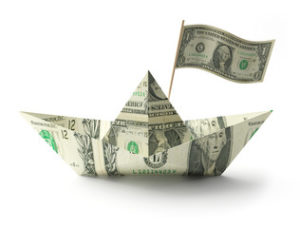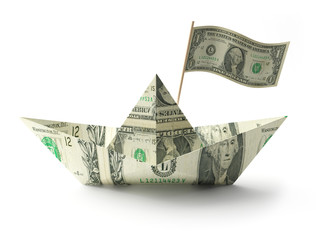The reasoning behind value for money.
How confusing it can be for crew to understand the spending behaviour of the Pocket Superyacht owner. The owner is obviously financially well off and spends money in a truly irrational way. On a yacht! To name but one example. But there is a difference between rational and emotional value for money.
One day the captain finds himself in a huge yacht chandlery, a bit like a Toy’s Are Us for sea-going adults. He’s got the yacht’s credit card in his hand. He feels like he is holding a loaded gun and he is surrounded by targets. He has the opportunity to live his fantasy and buy everything he ever wanted. In his head he tries to justify what he wants to spend. Surely life is easier and the boat is safer if you have spare parts for… everything and the galley sink. The guests will surely love to use every toy that Budget Marine sells. Fishing will turn into catching if we have more than one carbon fibre rod and specific lures for every contour line on the chart.
A week earlier, the owner was presented with three price quotations for a new mainsail. (Yes, this captain does a good job at providing options when it comes to the bigger expenses.) Although the yacht is not a race yacht by any standard, the owner opts for the most technical cloth. This is consequently the most expensive sail too. It’s about the price of a Jaguar F Type.
A week has gone by since the captain’s trip to the chandlery. He has managed to control himself and only bought a few essential items. Then the owner notices the 20$ price tag on the yacht’s new (and 2nd) bucket. He makes some tongue in cheek remark and puts Rolls Royce and buckets in one sentence. He doesn’t kick up a big fuss. However the point that 5$ to 10$ has been overspent has been made.
So the captain is left to wonder how such a financially powerful individual can moan about a couple of bucks. While, when it came to buying a new mainsail, he chose the most expensive option.
The answer is value for money.
The Oxford dictionary refers to value for money as: “Used in reference to something that is well worth the money spent on it.” A more detailed explanation is provided by businessdictionary.com: A utility derived from every purchase or every sum of money spent. Value for money is based not only on the minimum purchase price (economy) but also on the maximum efficiency and effectiveness of the purchase.
Unfortunately the judgement on what is regarded as value for money is not bulletproof either. It is a biased feeling. But this is where communication comes in. The owner’s reasoning, right- or wrongfully, may be that the top-end sail will last longer. Maybe because it simply looks better. Heck, he or she may even think that since it is lighter to hoist, it would cause less wear and tear on the running rigging…
When it comes to the salary of the captain, a good captain adds value to it by steering the owner in his selection using expertise. There is always a possibility that the expertise is thrown over the side and the owner wants to cruise around the world with a fragile, expensive but ever-so-sexy black sail. That would then be the difference between rational value for money and emotional value for money.

